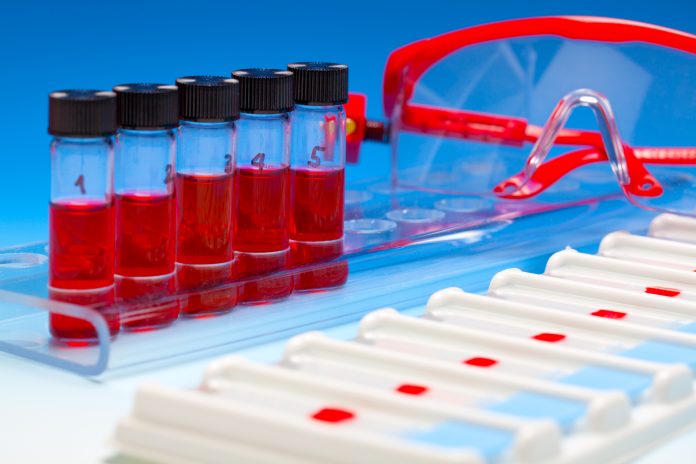
Researchers from UCLA School of Dentistry and the David Geffen School of Medicine at UCLA have won a five-year, $5 million grant from the NIH’s National Cancer Institute to develop liquid biopsies for lung cancer.
The award is intended to support further development of liquid biopsies, with the goal of improving methods for early detection of lung cancer, UCLA said.
Among research to be funded by the grant is a study that aims to enroll at least 300 patients at risk for lung cancer, then test their blood and saliva using a UCLA-developed technology, electric field-induced release and measurement (EFIRM) liquid biopsy.
The technology, created in the lab of David Wong, D.M.D., D.M.Sc., principal investigator and professor of oral biology and medicine at the UCLA School of Dentistry, is designed to detect the presence of tumor mutations. Dr. Wong and colleagues said they will develop and validate independent assays for 10 DNA mutations commonly observed in lung cancer as well as introduce a 6-biomarker panel of miRNA designed to complement and strengthen the blood-based molecular signal of lung cancer.
“Our overall research proposition is that blood-based biomarkers using the eLB-Lung Cancer Detection Panel (eLB-LCDP) will inform the accurate and robust classification of nodules as benign or malignant,” Dr. Wong and colleagues stated in an abstract of their project (1U01CA233370-01).
EFIRM liquid biopsy (eLB) has already shown high sensitivity detecting circulating DNA mutations in patients with EGFR-mutant lung cancers, the researchers added. Dr. Wong, who is also the dental school's associate dean for research, and his team said the earlier study showed that the technology can detect early-stage lung cancer with greater than 90% similarity with traditional tissue biopsies.
According to UCLA, the researchers aim to outperform current standard of care in diagnosing lung cancer, which involves a low-dose computed tomography scan of the lungs, by evaluating the presence of indeterminate lung nodules, then following these nodules over time to assess whether they begin to look suspicious for lung cancer.
The challenge of evaluating indeterminate lung nodules is differentiating between individuals with a low likelihood of lung cancer who may benefit from future scans and individuals harboring lung cancer, who may require lifesaving invasive procedures. The researchers reason there is an unmet need for a noninvasive, inexpensive test to detect lung lesions that can be used in tandem with low-dose tomography, which can reliably differentiate between indeterminate pulmonary nodules that are cancerous or benign.
“Our ultimate goal is to use our new panel as a guide to identify at least 60% of lung cancer-associated biomarkers in those undetermined cases where the patient may or may not have cancer,” stated Denise Aberle, M.D., principal investigator and professor of radiology at the David Geffen School of Medicine at UCLA. “The National Cancer Institute's award moves the needle forward for oncologists and care teams who are trying to save lives.”
Under Dr. Aberle's guidance, blood and saliva samples will be obtained from at-risk patients being seen at the Ronald Reagan UCLA Medical Center and other UCLA Health clinics for testing at Dr. Wong's lab. Within a day, using the UCLA-developed technology, a diagnosis will be made as to whether the patient should undergo a biopsy.
The results will be combined with those of detailed, quantitative image analyses to develop predictors of lung cancer in patients with indeterminate lung nodules, UCLA said.
The NCI grant award required an academic-industry partnership that the UCLA researchers fulfilled by teaming up with EZLife Bio, whose founder Wei Liao, Ph.D., P.E., co-invented the EFIRM reader and plates. Another co-inventor, Fang Wei, Ph.D., is adjunct associate professor at the UCLA School of Dentistry, will join the study team as an academic investigator.
UCLA said the grant was one of only six such awards made nationally.
“Over the next five years, we anticipate clinically validating a liquid biopsy test that can effectively and inexpensively diagnose patients who have indeterminate lung lesions in near-real time testing,” added Steve Dubinett, M.D., co-investigator and chief of pulmonary and critical care medicine in the Geffen School.
Dr. Dubinett is also the director of the UCLA Lung Cancer Research Program; his associate, Kostyantyn Krysan, Ph.D., will join the research team. Drs. Dubinett, Aberle, and Wong are all members of the UCLA Jonsson Comprehensive Cancer Center.










